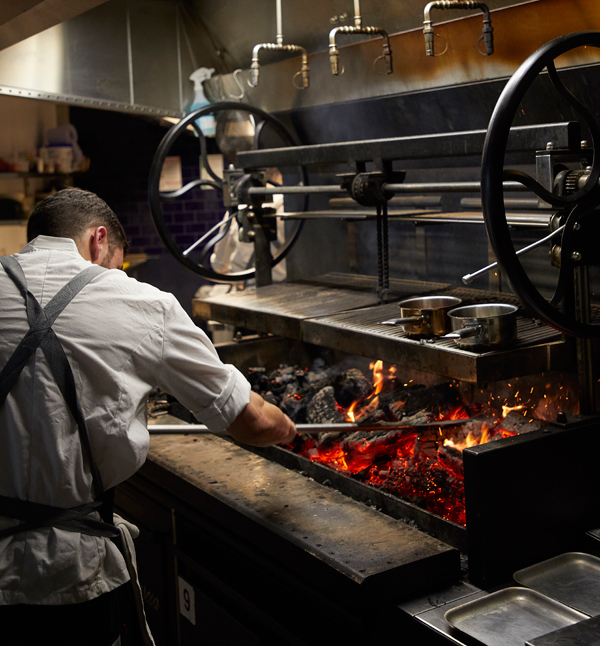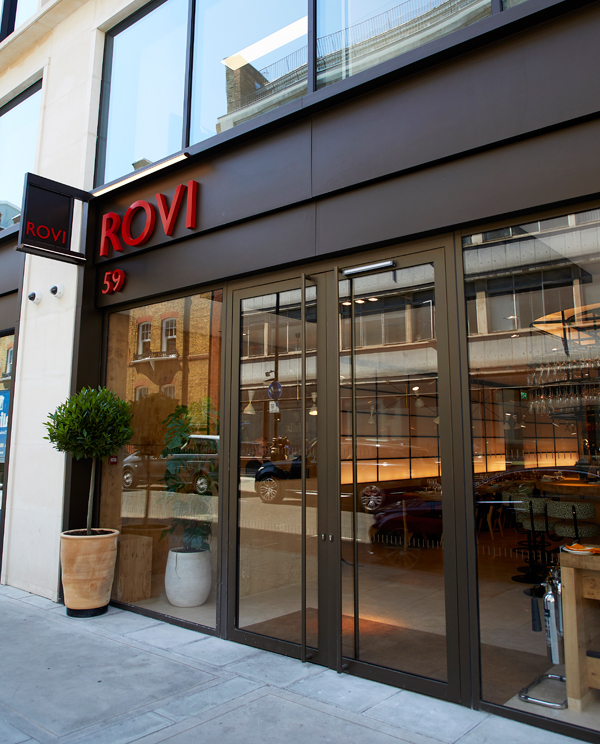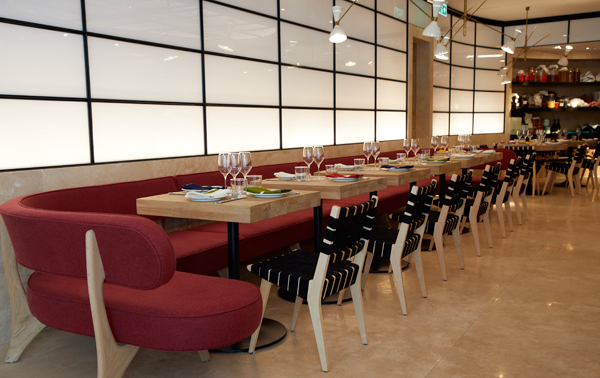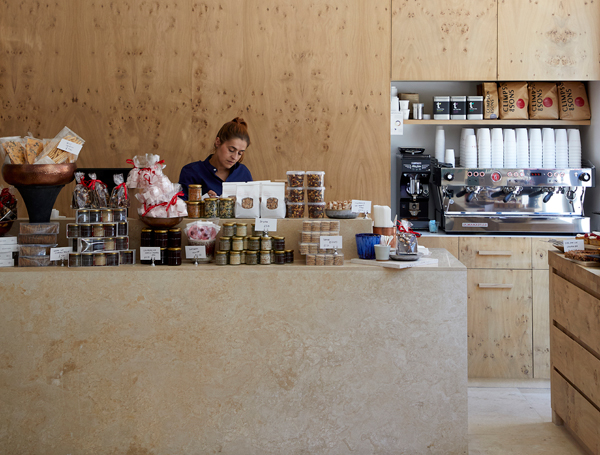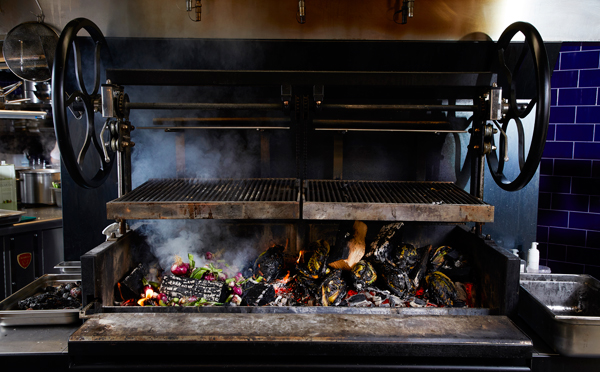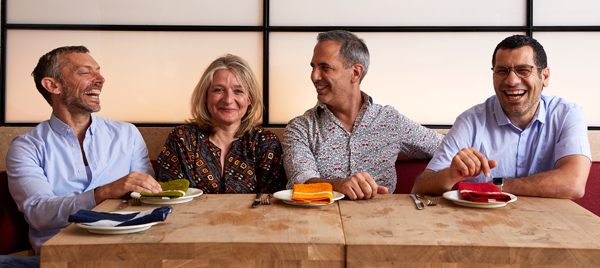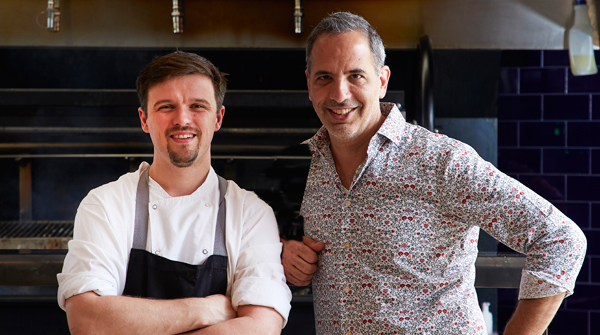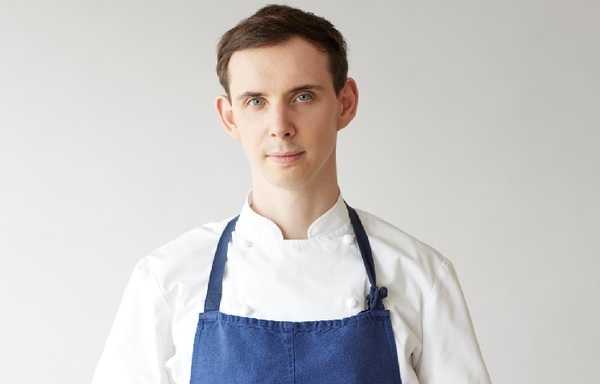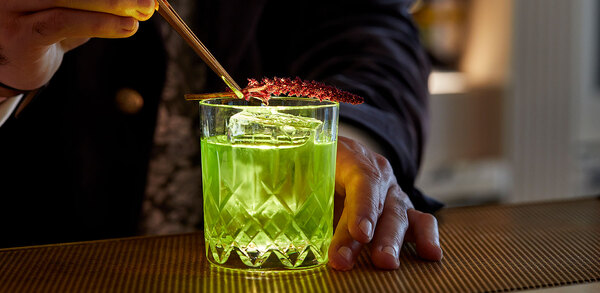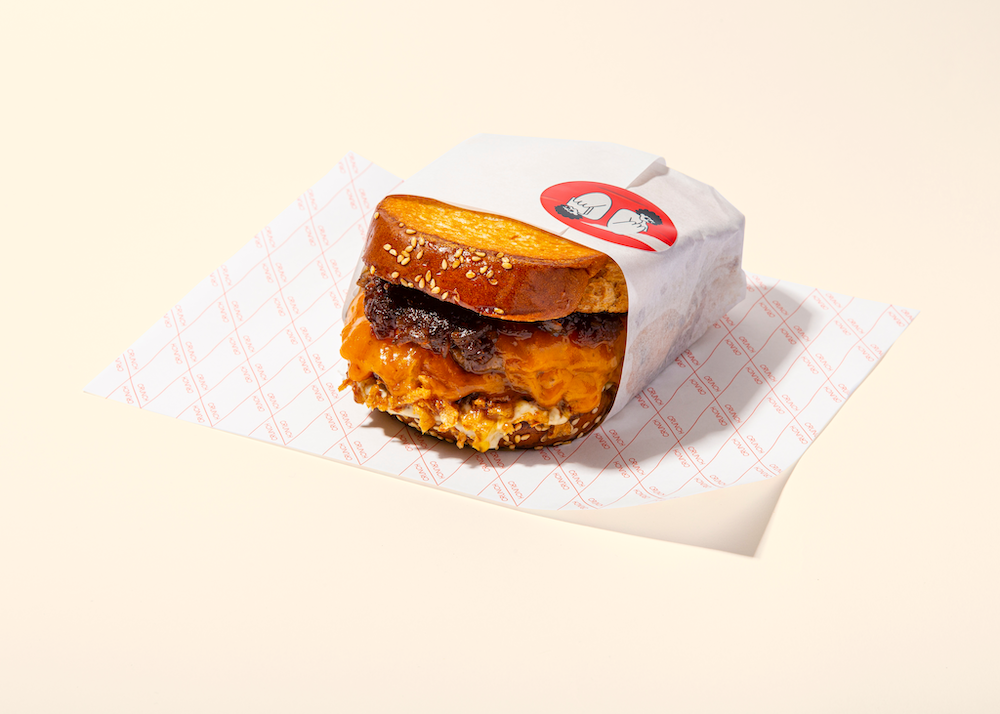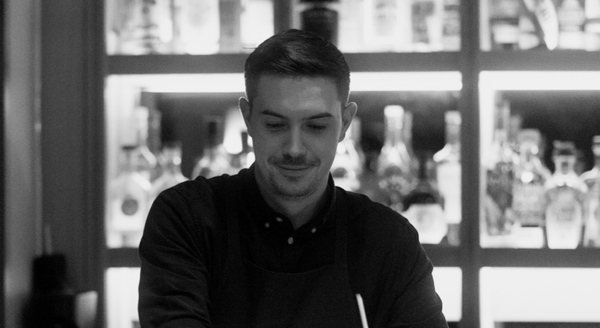Yotam Ottolenghi: blazing a trail
Yotam Ottolenghi has always been known for his vegetable-centric dishes, but at Rovi, his new restaurant, he's taking it to the next level, simply grilling produce that is at its absolute peak on the huge, open, charcoal-fired grill he's installed in the dining room, creating a menu that celebrates intense flavours. Emma Lake meets the team behind the chef's latest London restaurant
Yotam Ottolenghi's latest restaurant venture, Rovi, is a celebration of "unadulterated things". The chef and his team have taken a step back from the delicate technicality of their Soho restaurant Nopi to celebrate the flavour of beautifully produced ingredients. It's a mission helped by Rovi's focal point, an enormous grill that is the domain of head chef Neil Campbell, formerly of Bruno Loubet's now-closed Grain Store, who exalts the merits of "simple, honest" food.
Describing the ethos of Rovi, Ottolenghi says: "We wanted to pare things down. We've got our history of working with vegetables and all these wonderful condiments and we thought, let's put everything back on that and take really good, seasonal vegetables and really see what we can do with them on the grill."
Sami Tamimi, executive head chef of the Ottolenghi group, adds: "It's unadulterated things. We have a dish of runner beans that's just beans off the grill with goats' cheese, peach and smoked almonds. It's really simple."
The grill sits at the head of the oval-shaped restaurant, marking the point where the dining area meets the domain of the chefs. Flames flicker through the bars of the huge black wrought-iron structure, creating a fantastic focal point for the modern site. The shelves to either side hold pickles, fermenting vegetables and fruit, as well as charcoal to feed what Ottolenghi refers to as "this wonderful monster".
Tamimi adds: âThe grill really opens up avenues. Whatever you do in the kitchen, you get a whole new layer of flavour when you have an open fire and proper charcoal â" the added flavours are incredible.â
Rovi, the Ottolenghi groupâs sixth restaurant, comes 16 years after the chef erupted onto the London food scene with his Notting Hill deli showcasing vibrant platters of vegetables. Two more delis followed, in Belgravia and Spitalfields, as well as the Ottolenghi restaurant in Islington and, of course, Sohoâs Nopi. That is before mentioning six â" soon to be seven â" bestselling cookery books and weekly columns for The Guardian, among other publishing exploits.
Ottolenghi says: âWe grew organically. We got influenced by the people who worked with us and for us â" we never planned anything. I remember when we opened Islington it was too big for us; we didnât know what to do. We took it step by step, learned from a lot of mistakes, and tried not to make those same mistakes again.â
With lessons learned, in June the team took on its largest venture yet, opening Rovi (the name is a play on the siteâs location in Fitzrovia and Nopi). Despite some opening hiccups, including the state-of-the-art, environmentally friendly extractor system failing and forcing a three-week closure, the 85-cover site has received rave reviews. The Evening Standardâs Fay Maschler described the food as âa new definition of virtue, health, temptation and redemptionâ, while Nigella Lawson tweeted about âa deliriously delicious lunchâ.
The two enthused about dishes including peas, broad beans, chilli and garlic; tempura stems and herbs with Szechuan pepper and elderflower vinegar; hot tomatoes, cold yogurt and urfa chili, as well as squid and lardo skewers with a red pepper glaze and fennel salad.
Vegetables take centre stage at Rovi, as you would expect at an Ottolenghi restaurant, but carefully sourced meat and fish also feature in dishes such as grilled fish, Scotch Bonnet sauce and corn flatbread; onglet skewers, beef fat and fermented green chilli; and the Jerusalem mixed grill with baharat onions and pickles.
Ottolenghi says: âItâs vegetable-centric, but we wanted to put emphasis on the lesser cuts of meat â" none of the dishes really use prime cuts. It made complete sense to use the more sustainable bits, such as the liver and hearts we use in the Jerusalem mixed grill.â
Sustainability has been considered carefully in the sourcing of ingredients and the back page of Roviâs menu maps out routes to the restaurant from suppliers including a micro-herb farm in south Londonâs Elephant and Castle and a husband and wife team at the Ethical Shellfish Company, which sells hand-dived scallops.
When serving âunadulterated thingsâ, selecting produce at its peak is everything. Ottolenghi explains: âWe work with seasons and buy in the season, which is why we do a lot of pickling, fermentation and preserving. You get wonderful strawberries in the season and we do something with them, like a chutney or a preserve, and then we can use it throughout the year.â
Ottolenghi and Tamimi, who co-authored cookbook Jerusalem, explain that Roviâs menu was developed in the groupâs Camden test kitchen in collaboration with Campbell and head development chef Calvin von Niebel, among others.
Ottolenghi says: âMost of the dishes in this restaurant are not my creation or Samiâs creation, theyâre the result of a collaboration in the test kitchen. We have a braised beef, spring onion and chilli dish thatâs almost Asian-inspired â" that was Calvin and his great training in Thai cuisine. And thereâs a parfait dish from Neil thatâs quite Scottish. The menu is not anyoneâs brainchild, itâs communal.â
This collaboration runs throughout Ottolenghiâs ventures. Alumni, including Ramael Scully, now of Scully in Londonâs St Jamesâs, have applauded the chef for giving them the chance to bring their own style to the pass.
For Ottolenghi and Tamimi, this is just a matter of good sense. Ottolenghi says: âWe benefit from people having different backgrounds, and letting them do their own stuff can make the menu richer. If you let them be creative, things are so much more interesting and itâs really worked for us. Also, because weâre mongrels from the Middle East, we have very diverse backgrounds: Sami has Palestinian and Jewish influences over his cooking, I had my European background from where my parents grew up and also my Middle Eastern upbringing. I think these combinations can be quite effective and create interesting dishes.â
Tamimi adds: âThis is why we created the test kitchen. Itâs a creative hub where people come in and try their stuff. Thereâs always a conversation with someone who is very British working alongside someone from South Africa, Australia or South America, and itâs always an evolving conversation.â
As well as the work going on in the test kitchen, all of the groupâs sites have roundÂtable meetings where gatherings of chefs from the most senior to the most junior can present, taste and critique dishes. Ottolenghi says: âThey could be just at the beginning of their career, but their dish could end up on the menu if Sami or I approve it.â
When Ottolenghi, Sami and their team began serving their vegetable-centric recipes 16 years ago, it changed peopleâs perceptions and the âOttolenghi-style saladâ has been much copied. But, more than this, the outlook has shifted firmly into the Ottolenghi camp, with many chefs using vegetables to showcase their skills.
Ottolenghi says: âWhen we started, to have vegetables at the centre of what you were offering was incredible â" you wouldnât see it. You would go to a restaurant and it would be meat-centric and youâd have vegetables as a side. Itâs a development that has really taken off. You now see the most serious chefs doing amazing stuff and putting vegetables at the forefront â" itâs almost sexier to use vegetables than to use meat and fish. You can be much more creative with vegetables; it increases your scope and your possibilities.â
However, despite their love of vegetables, neither Ottolenghi nor Tamimi has time for evangelists of clean eating or diets that exclude food groups. Ottolenghi says: âFor me, itâs always been about joy. We sit down, we choose our food based upon how delicious it is, and thatâs always been the top priority. Everything that comes after that is important but not as important as the real eating experience.
âThe part of the world we come from, vegetables and grains are a staple, so you can season something with lamb bones or pieces of meat, but essentially, itâs veg-centric cooking, so itâs not an effort, itâs a choice. We never had a stance of saying you should eat more vegetables â" vegetables are delicious and theyâre just a good thing to have. When people start with this moralistic approach, you start to yawn.â
Tamimi adds: âI really believe you should eat everything â" whatever you like. Life is short, just enjoy it: less sugar, more sugar, a bit more butter â" whatever.â
About Rovi Rovi 59 Wells Street, London W1A 3AE
www.ottolenghi.co.uk/rovi**
From the menu
⢠Pickled and fermented, Valdeón cheese or duck pastrami £7
â¢Â Corn ribs, apricot sauce, chipotle salt £7
â¢Â Grelot onions, whipped feta, green gazpacho £8
â¢Â Celeriac shawarma, bkeila, fermented tomato £14.50
â¢Â Mussels, cascabel oil, hay-smoked Pink Fir Apple potatoes £9.50/£18
â¢Â Congee, braised beef, fermented daikon £19.50
â¢Â Ricotta doughnuts, gooseberries, pine honey £8
â¢Â Beetroot and chocolate fondant, chilli, crème fraîche ice-cream £9
â¢Â Ottolenghi brittle (salted caramel and hazelnut/raspberry and pistachio) £6
The brains behind the business
Ottolenghi says: âWe didnât want to expand too quickly. We have six locations now, but really, itâs not too much, itâs under control. We havenât expanded into other parts of the world or other cities in England, so itâs just a case of expanding where we feel comfortable and knowing weâre selling a really good product.
âControl is key. All four of us [Ottolenghi, Tamimi, Bar and Staeubli] are nightmares about losing control. I could lose sleep if I thought I would walk into one of the restaurants and not be happy with the food.
âQuality control is hard â" it sounds boring, but itâs every restaurateurâs main goal. You set it up, make sure everything tastes great, and then after a week or a month or two you have to ensure the same cooking is still there.
âIn our restaurants we have a tasting in the kitchen at about 11am. All the dishes on the menu are prepared for the manager or the head chef, and at Nopi in particular itâs done religiously. Itâs not cost-effective, but itâs very good in terms of quality.â
Noam Bar, co-founder
Noam Bar is described as Ottolenghiâs âstrategic thinkerâ, the one who ensures the group is developing on the right course.
Telling The Caterer about the development of Rovi, he says: âWe never have a grand plan, itâs always, OK, whatâs interesting to do next, whatâs the next challenge?
âAt first we thought about opening another Ottolenghi with some new features, but then when we started to develop it, it turned into a totally new concept. âWe knew we wanted the grill â" the grill was the only given â" and when we started exploring and saw how beautiful it was we thought it could be the centrepiece of the whole restaurant.
âItâs a challenging space with about 20 angles, but Alex our architect had the idea to carve a dome within that and itâs very natural for the grill to be at the head of that dome.â
Cornelia Staeubli, managing director
Cornelia Staeubli is described as the one who âmakes things workâ.
In challenging times the company has proved resilient, helped by the âmany-headed beastâ it has become, with fans of Ottolenghiâs writing becoming deli and restaurant guests and vice versa.
Staeubli says: âWeâve been very lucky, but itâs very challenging staff-wise.â She continues: âItâs Brexit. London at the moment is not where young people want to start a new life, not until they know whatâs going to happen. The pound is lower, so thereâs less money to send home, especially for lower-skilled staff such as kitchen porters.
âWeâre very passionate and extremely proud of what weâre doing and, for me, itâs about ensuring that the staff also feel passionate, that they feel part of the family and part of that growth.â
Staeubli explains that development is key, and as well as helping staff move through the ranks the company has supported several high-flyers to start out on their own, including former Nopi head chef Ramael Scully. Both Bar and Staeubli suggest this is a growth avenue for the future.
Staeubli says: âWe empower people in general when they are in the company. If theyâre very creative but they donât have as much knowledge on the business side, we can help them.â
Neil Campbell, head chef
Neil Campbell is the head chef at Rovi and spent much of the six months prior to its opening in the groupâs test kitchen or doing stages around Ottolenghiâs restaurant and café sites. Campbell was directed towards Ottolenghi by Bruno Loubet, his former boss at the Grain Store, where he was head chef.
Campbell tells The Caterer he enjoys serving âsimple, honest foodâ and that he comes from a position of no-waste cooking. Fermenting and pickling make up much of the restaurantâs fare and any remaining waste products are used for staff food.
He says: âItâs vegetable-based eating and more vegetables make a better way of eating â" itâs a healthier way for the world to live. We source ethically, we support small farms; itâs a simpler vibe than what Ottolenghi has been doing before, and a simple, honest product.â
Campbell acknowledges that his new centrepiece grill has taken some getting used to. âItâs like a child â" we donât know exactly how it works,â he explains. âSometimes it wants feeding and we havenât realised, and then sometimes we overfeed it and it doesnât do so well, but itâs hot â" very hot.â



